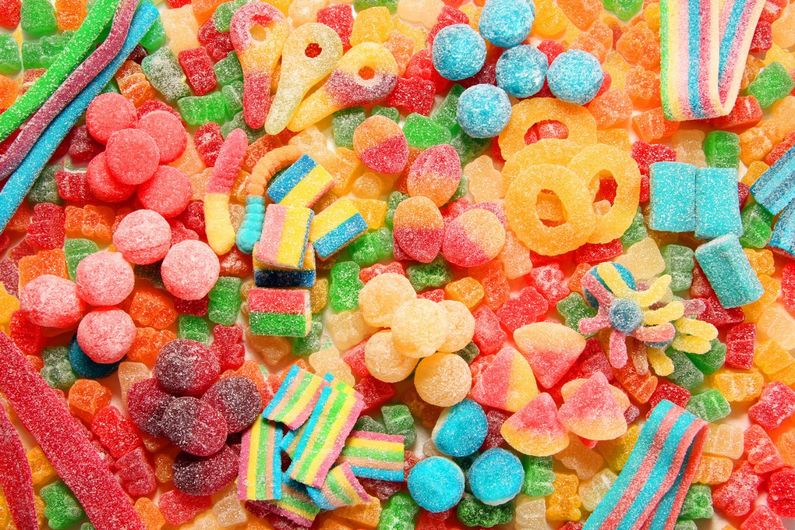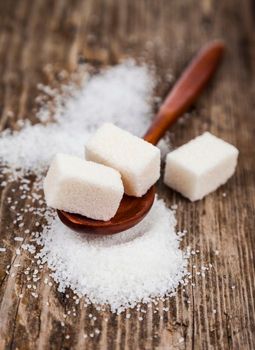The secret life of sugar
- UdeMNouvelles
10/30/2023
- Béatrice St-Cyr-Leroux
You’ll probably eat some today. In chocolate, gummies, hard candy, caramels or lollipops. But what do you really know about sugar?
Without it, cake wouldn’t be nearly as tempting. Ice cream as enticing. Fruits as flavourful. Pastries as scrumptious. Cream puffs as scrumdiddlyumptious. There’s no denying it: sugar is music to our mouths.
In crystal, syrup or liquid form, the sweet compound is a staple ingredient in our food. And yet it continues to be the subject of myths and misconceptions. Some are fascinating; others are cause for concern.
Hold on to your aprons: professors in Université de Montréal’s Department of Nutrition have the inside scoop on the sweet stuff, from how it works and the role it plays in our diet to its health effects and social and environmental impact.
An essential ingredient
Sugars are carbohydrates, one of the three major families of macronutrients in our diet (along with lipids and proteins). They are fuels that provide the energy our organs need to function: we cannot survive without sugar in our blood.
When we ingest carbohydrates, some are used right away to provide energy, while others are stored in the liver and muscles for future use. Only in cases of excess—when the body can’t burn the calories consumed during a meal—are carbohydrates are transformed into fat and stored in adipose tissue.
Not all carbohydrates are created equal
According to professor May Faraj, carbohydrates should make up 45 to 65 per cent of our daily calories. This may come as a surprise, as they’re sometimes depicted as the enemy. “A recent study that followed thousands of American adults for 25 years found that people who got 50 to 55 per cent of their total energy from carbohydrates had the lowest mortality rates, while those who got more than 70 per cent or less than 40 per cent had the highest rates,” she said.
But those carbohydrates should come largely from foods with good nutritional value, Faraj stressed: “That means foods that are rich in vitamins, minerals and fibre, such as fruits and vegetables, beans and lentils, and whole grains. Less than 10 per cent of total daily calories should come from added sugars such as table sugar, brown sugar, fructose, corn syrup, honey or maple syrup.”
Delicious, addictive or both?
When we eat sugar, it immediately activates the brain’s reward circuit and leads to the release of dopamine, a molecule that plays an important role in the reward pathway and reinforces our behavior.
“The reward effect is triggered as soon as you put sugar in your mouth and is repeated when the sugar is detected by the neurons in your digestive tract,” explained professor Stephanie Fulton.
Fulton pointed out that one cannot become “addicted” to sugar in the medical sense, even though it activates the same system as the one involved in drug and alcohol addictions and can lead to compulsive eating.
“It can’t be classified as an addiction, since people don’t develop a tolerance to sugar or experience withdrawal and it doesn’t affect their daily routine or interfere with their personal or professional lives in the same way addictive drugs do.”
Always room for dessert
Because of the rewarding effects of eating sugar, the brain manages to override the feeling of satiety in its quest for sugar-induced bliss. In addition to that system override, Fulton adds, there’s a learned element and a desire for culinary variety.
“During childhood and adolescence, we learn that even if we’re not hungry, sugar still produces that reward effect,” she said. “There’s also the variation it brings: most main courses are savoury, so the sweetness of dessert comes as a nice change.”
That sweet tooth
Some people are more drawn to sweets than others. According to Fulton, it could be due to an interaction between genetic and environmental factors.
A person who grew up in a home with a lot of sugary foods and drinks will get used to it. At the same time, there do seem to be genes linked to self‑control and impulsivity that are associated with sugar cravings.
Pain and stress relief
According to Fulton, studies have shown that sugar reduces pain, especially in babies and young children. Eating a sweet food also seems to reduce short-term cortisol levels in people experiencing moderate stress.
“Stress is a negative state that can be counteracted by sugar’s reward effect,” said Fulton. “Of course, over the long term and in large quantities, sugar has adverse effects on the organs and nervous system, but in moderation it does no harm.”
Bitter aftertaste
Sugar is a commodity traded on the world market, just like oil, wheat, coffee and cotton. It comes mainly from sugarcane plantations, an industry with serious social and environmental consequences. While those vary according to farming practices and local policies, the picture looks bleak in both the Global North and Global South.
According to the World Wildlife Fund, sugarcane is one of the most water-intensive crops in the world, leading to massive soil erosion and water contamination, as well as deforestation and air pollution (as the unused parts of the plant are burned).
Historically, the sugar industry has also been linked to slavery. Even today, the health and economic conditions of people working in sugarcane fields are far from satisfactory.
Professor Malek Batal witnessed the consequences of sugar production on a recent trip to Champerico, a sugarcane-producing region in Guatemala.
“I saw plantations riding roughshod over land rights, high levels of water contamination, widespread skin disease due to pesticides, high rates of diabetes, polluted air and very visible poverty,” said Batal. “That’s in addition to the kidnappings and assassinations of people who speak out against the large corporations that control sugarcane production.”
In light of such an abysmal track record, Batal encourages people to support sugarcane-growing communities and sustainable farming practices by buying Fairtrade Canada-certified sugar.
Sugar myths
- Natural sugars like honey and maple syrup aren’t “better for you” than refined sugar. They contain such small amounts of nutrients that they cannot be considered a source of nutrition rather than just a source of calories.
- It’s not true that sugar makes children restless and hyperactive; it’s because of the situations in which it is consumed. “Sugar has no direct influence on the neuronal centres responsible for movement,” Fulton explained. “It’s just that sweet foods are often served at events where children have fun—like birthday parties, Halloween, Christmas, and so on—and when children are having fun, they tend to move around more.”
















